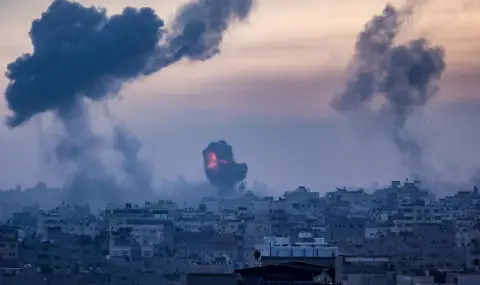Israel now directly attacks anyone who attacks the country. But what is the purpose – to end the war in the Middle East or change the balance of power there, ARD asks.
The Israeli army carried out its largest-ever attack against the Houthis in Yemen, with black smoke billowing over the port city of Hodeidah last night. Dozens of fighter jets are said to have joined the attack on the militia - some 2,000 kilometers from Israel. "We know how to hit and hit very far away from us, we can go further. This attack was a warning,” said the chief of the Israeli army, Herzi Halevi, quoted by ARD.
Halevi also explained that Israel is currently attacking Hezbollah in Lebanon because the group is at the center of the so-called "Axis of resistance” of Iran. But according to the Israeli military, their main goal is to weaken all Iran-related groups in the Middle East.
Attacks against energy infrastructure and ports
Iran is providing weapons to the Houthis through the port of Hodeidah and Ras Issa, the Israeli military claims. Therefore, these two cities, as well as several power plants, were the target of Israel's strikes in Yemen. The attack was defined as retaliation for Houthi attacks on Israel.
In recent days, three ballistic missiles fired by the Yemeni militia have reached the Tel Aviv area. Two were intercepted, but one fell in the northern part of the city, recalls ARD. A drone also struck the Israeli port city of Eilat. Israel's Defense Minister Yoav Galant stated that "the army has no interest in expanding the war and opening additional fronts”. However, he is adamant that if someone attacks Israel, as the Houthis do, there will be retaliatory strikes.
Threats are timed out
Israeli Prime Minister Benjamin Netanyahu has said similar things before, writes ARD. The message is clear - the time for threats is over. Israel now directly attacks anyone who attacks the country. But what is the purpose? End the war in the Middle East or change the balance of power there?
Netanyahu declared that he was "changing the reality in the Middle East”, ARD recalls. In the words of the leader of Israel, "by changing the balance of power, we have the opportunity to create new alliances in the region”. However, Netanyahu's visions of a radical change in the Middle East are far from reality. In fact, his coalition government is repeatedly threatened with collapse.
National Security Minister Itamar Ben-Gvir once again threatened to destroy the coalition if Israel agreed to cease fire in Lebanon. Over the weekend, the far-right politician provoked again by handing out baklava at a public event and said he was "drawing for the death of the enemy”.
Critic of Netanyahu enters cabinet
While Ben-Gvir exudes satisfaction, the families of the hostages Hamas still holds in Gaza are far from feeling that way. The escalation in Lebanon may further complicate the return of the hostages home, writes ARD.
At the same time, Netanyahu announced that he will include his former opponent Gideon Saar in his cabinet. According to him, Saar will be given a seat in the security cabinet, the body that oversees the management of the ongoing war.
